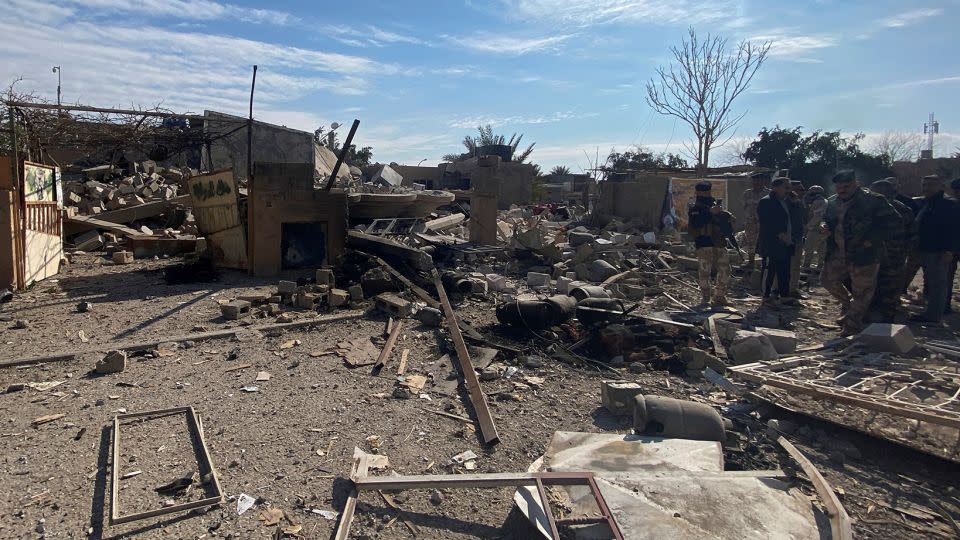US corrects earlier claim and confirms it did not give Iraq advance notice of Friday’s strikes

US officials said Monday that Iraq was not notified ahead of a series of strikes on Iran-linked targets in the country, contradicting earlier statements that the Iraqi government was notified before the strikes occurred.
“As for this specific response on Friday, there was not a pre-notification. We informed the Iraqis immediately after the strikes occurred,” State Department deputy spokesperson Vedant Patel said at a briefing on Monday.
“Iraq, like every country in the region, understood that there would be a response after the deaths of our soldiers,” he noted.
In a call with reporters on Friday, National Security Council spokesman John Kirby had said the US “did inform the Iraqi government prior to the strikes.” On Monday, however, following the State Department briefing, Kirby confirmed that he misspoke.
In a statement to CNN, Kirby said he “responded with information that I had been provided at the time” after the strikes on Friday.
“It was not as specific as it could have been, and I regret any confusion caused,” he said. “That said, we had made no secret – both to Iraqi officials and in public channels – that we would respond to the attacks.”
Kirby apologized for the mistake on Tuesday.
“I deeply apologize for the error and I regret any confusion that it caused,” Kirby told reporters.
Kirby said the assertion was based on information provided to him “in those early hours after the strikes.”
He continued, “Turns out that information was incorrect. And I certainly regret the error and I hope that you’ll understand there was no ill intent behind it, no deliberate intent to deceive or to be wrong.”
The correction came days after the US struck more than 80 targets in Iraq and Syria associated with Iran’s Islamic Revolutionary Guard Corps (IRGC) and its affiliated groups. Among the targets hit were command and control operations centers, rockets, missiles, intelligence centers, and logistics and munition supply chain facilities. The strikes came as retaliation for a drone attack on a US outpost in Jordan that killed three US soldiers and left dozens more wounded.
Iraq denounced the US’ strikes in a statement, calling the action a “flagrant violation of Iraq’s sovereignty.”
“The United States’ aggression against Al-Qa’im in Anbar Governorate and other Iraqi border areas in the west of the country, which resulted in the deaths of many Iraqi citizens, represents a flagrant violation of Iraq’s sovereignty,” the statement said. “Despite the Iraqi government’s repeated denouncements of such actions, these attacks further escalate tensions and threaten regional security and stability.”
The confusion over Iraq’s notification comes amid growing calls from the Iraqi government for the US to withdraw its forces, and as the US and Iraq are expected to soon begin talks to discuss the future of the US presence in the country.
Officials have declined to say directly if the talks would result in a withdrawal of US forces, saying previously that there is a need to “transition to a normal bilateral security cooperation relationship.” A senior defense official said in January that the discussion was not “a negotiation about the withdrawal of US forces,” but that the US and Iraq would “work together to shape future US military presence.”
On Monday, a NSC spokesperson echoed Kirby, saying that Iraq, “like every country in the region, understood there would be a response” to the deadly drone attack in Jordan.
“For operational security reasons, we did not provide any kind of official pre-notification with specific details on these strikes,” the spokesperson said. Pentagon spokesman Maj. Gen. Pat Ryder was also asked about notifying the Iraq government of the strike, and did not directly address it, saying only that Iraq is “a valued partner.”
“If Iraq is a valued partner, why didn’t you tell them ahead of time that this strike was coming?” Ryder was asked at a Pentagon briefing on Monday.
“I won’t speak for Iraq, as I highlighted, they are a valued partner, we’ll continue to work closely with them, consult with them closely,” Ryder said. “We have consistently communicated to the Iraqis and others that we reserve the right to defend our personnel from attacks by Iranian-backed militants in Iraq, which is what you saw on Friday.”
This story has been updated with additional details.
CNN’s Betsy Klein contributed to this report.
For more CNN news and newsletters create an account at CNN.com


